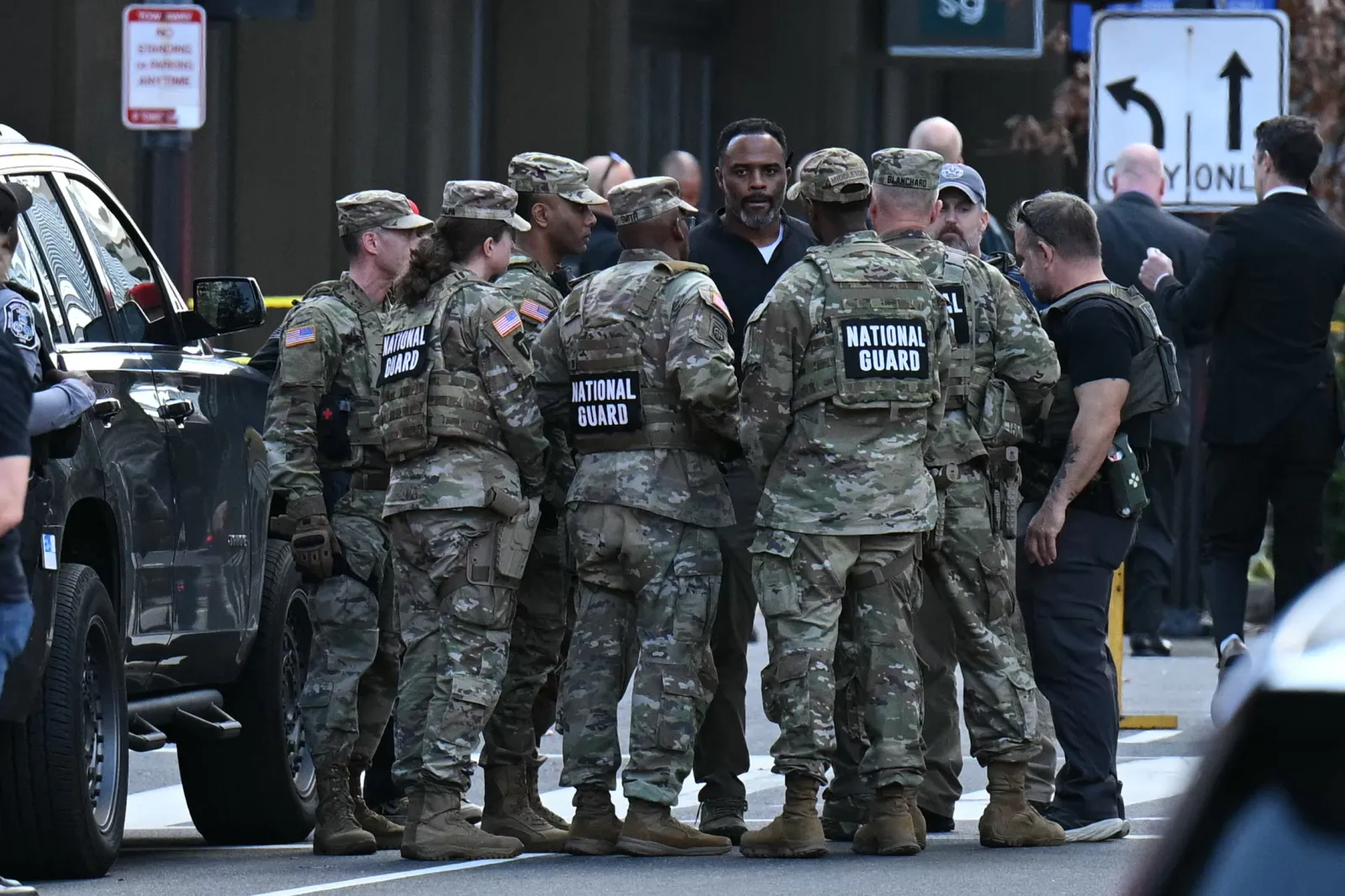 By Hugh CameronShareNewsweek is a Trust Project member
By Hugh CameronShareNewsweek is a Trust Project memberBoth advocates and sceptics agree that artificial intelligence is poised to drastically alter the structure of the American workforce, as the advancing technology becomes capable of replacing an ever-growing range of roles currently performed by humans.
According to a recently published study from the Massachusetts Institute of Technology (MIT), AI may already be able to replace 12 percent of American workers, representing about $1.2 trillion in wages.
Newsweek has contacted members of the research team for further comment.
Why It Matters
The U.S. economy has increasingly leaned into AI research and adoption, with some estimates suggesting private investments in the technology totaled almost half a trillion dollars over the past decade. Government backing has also grown, with President Donald Trump pledging billions toward AI and related energy investments, while voicing his intention to make the U.S. the "undisputed world leader in artificial intelligence."
However, this enthusiasm has been tempered by concerns from those who believe AI will cause an unrivaled disruption to the labor market, replacing both repetitive blue-collar jobs and more skilled roles, such as design and coding.
AI has already been linked to some of the layoffs that have swept the workforce this year, with Amazon touting the technology's "transformative" advancements upon announcing its plan to cut about 14,000 jobs.
What To Know
MIT researchers drew on a metric called the "Iceberg Index," designed to estimate AI exposure across the labor market.
Analyzing 151 million workers across 923 occupations in 3,000 counties, and covering more than 32,000 skills, researchers were able to predict how swiftly the technology's abilities might overlap with workers' occupational skills.
However, they make clear that the 12 percent estimate is a measure of "technical exposure—where AI can perform occupational tasks" rather than "displacement outcomes," adding that real-world labor impacts would depend on "firm strategies, worker adaptation, and policy choices."
"Current AI adoption concentrates in technology occupations representing 2.2 percent of labor market wage value," the study said. "Yet AI technical capability extends to cognitive and administrative tasks spanning 11.7 percent of the labor market."
The researchers highlighted several broad categories and sectors that were "AI-exposed," with key vulnerabilities including these:
- Computing and technology—"software engineers, data scientists, analysts, program managers, and related roles where current AI adoption is concentrated"
- Cognitive work, including financial analysis and administrative coordination
- Finance, accounting and similar business‑services occupations
- Professional services broadly, including in areas such as health care administration.
The analysis was limited to "technical and cognitive tasks," the researchers wrote, "where technology maturity and deployment patterns are observable." They added that the workforce implications of physical automation would "become increasingly relevant as capabilities mature."
 ...
...A previous study, published by Microsoft in July, provided a more complete view of which occupations are vulnerable to AI replacement.
Microsoft assigned each an "AI applicability score" based on an analysis of 200,000 user conversations with its Copilot chatbot and identified the most exposed professions:
- Interpreters and translators
- Historians
- Passenger attendants
- Sales representatives of services
- Writers and authors
- Customer service representatives
- CNC tool programmers
- Telephone operators
- Ticket agents and travel clerks
- Broadcast announcers and radio DJs
Microsoft also listed the roles its analysis suggested were, for now, immune to AI replacement:
- Phlebotomists
- Nursing assistants
- Hazardous materials removal workers
- Helpers—painters, plasterers, etc.
- Embalmers
- Plant and system operators
- Oral and maxillofacial surgeons
- Automotive glass installers and repairers
- Ship engineers
- Tire repairers and changers
A Senate report released in October warned that emerging technologies "could destroy nearly 100 million U.S. jobs in a decade." The report, based on a ChatGPT-assisted analysis, was compiled by Democratic staffers of Senator Bernie Sanders of Vermont, and it included its own ranking according to the total number and share of potential job replacements:
- Fast food and counter workers, 89 percent
- Customer service representatives, 83 percent
- Laborers and freight, stock, and material movers, hand, 81 percent
- Retail salespersons, 62 percent
- Stockers and order fillers, 76 percent
- Cashiers, 59 percent
- Office clerks, general, 66 percent
- General and operations managers, 47 percent
- Secretaries and administrative assistants, except legal, medical, and executive, 80 percent
- Home health aides, 40 percent
- Janitors and cleaners, except maids and housekeeping cleaners, 61 percent
- Registered nurses, 40 percent
- Bookkeeping, accounting, and auditing clerks, 76 percent
- Waiters and waitresses, 53 percent
- Heavy and tractor-trailer truck drivers, 47 percent
- Accountants and auditors, 64 percent
- Personal care aides, 25 percent
- Team assemblers, 61 percent
- Software developers, 54 percent
- Teaching assistants, preschool, elementary, middle, and secondary school, except special education, 65 percent
What People Are Saying
The MIT study said in its conclusion: "The Iceberg Index provides measurable intelligence for critical workforce decisions: where to invest in training, which skills to prioritize, how to balance infrastructure with human capital. It reveals not only visible disruption in technology sectors but the larger transformation beneath the surface. By measuring exposure before adoption reshapes work, the Index enables states to prepare rather than react—turning AI into a navigable transition."
Entrepreneur and former presidential candidate Andrew Yang said in an interview with Newsweek: "I talk to CEOs all the time, and a lot of them tell me they are downsizing in many cases due to AI replacing entry-level workers in particular."
He added: "I don't think enough attention is being paid to various downsides of the advent of AI, from job replacement to the splintering of reality to rampant identity theft to the changing of hiring practices in a way that will systematically block certain folks that are not on the good side of various data points."
What Happens Next
Estimates regarding the labor market impact of AI adoption continue to vary widely. Some suggest that the effect will be qualitative—changing roles rather than eliminating them en masse—while others offer more concerning forecasts.
Management consulting firm McKinsey, for example, estimates that AI could perform the tasks done by about 40 percent of U.S. professions, having previously predicted that as many as 30 percent of jobs could be automated by 2030.
Request Reprint & LicensingSubmit CorrectionView Editorial & AI Guidelines Add Newsweek as a preferred source on Google to see more of our trusted coverage when you search.
Add Newsweek as a preferred source on Google to see more of our trusted coverage when you search.Recommended For You
 U.S.Coca-Cola Sued by Johnny Cash Estate5 min read
U.S.Coca-Cola Sued by Johnny Cash Estate5 min read PoliticsList of Retailers Targeted in Boycott Starting on Thanksgiving5 min read
PoliticsList of Retailers Targeted in Boycott Starting on Thanksgiving5 min read PoliticsRepublicans Fear Doomsday Scenario in Tennessee Special Election5 min read
PoliticsRepublicans Fear Doomsday Scenario in Tennessee Special Election5 min read NewsWinter Storm Map Shows Areas Possibly Getting Hit for Thanksgiving3 min read
NewsWinter Storm Map Shows Areas Possibly Getting Hit for Thanksgiving3 min read NewsMacy’s Thanksgiving Parade 2025: How To Watch And Who’s Performing3 min read
NewsMacy’s Thanksgiving Parade 2025: How To Watch And Who’s Performing3 min read NewsCampbell’s Soup Fires Executive Over ‘Poor People’ Rant4 min read
NewsCampbell’s Soup Fires Executive Over ‘Poor People’ Rant4 min readRelated Podcasts
Top Stories
 NewsSarah Beckstrom, Andrew Wolfe Identified as National Guard Shooting Victims7 min read
NewsSarah Beckstrom, Andrew Wolfe Identified as National Guard Shooting Victims7 min read NewsUncommon Knowledge: Trump, Biden and the Real Record of Afghan Vetting5 min read
NewsUncommon Knowledge: Trump, Biden and the Real Record of Afghan Vetting5 min read NewsWinter Storm Map Shows Areas Possibly Getting Hit for Thanksgiving3 min read
NewsWinter Storm Map Shows Areas Possibly Getting Hit for Thanksgiving3 min read WorldUkraine War Live Updates—Russia Praises Trump ‘Realism’, Putin Promises Allies New Weapons2 min read
WorldUkraine War Live Updates—Russia Praises Trump ‘Realism’, Putin Promises Allies New Weapons2 min read National Guard Shooting Suspect Worked With CIA, Director Says4 min read
National Guard Shooting Suspect Worked With CIA, Director Says4 min read NewsTrump Admin Sends Striking Thanksgiving Message to ‘Illegal Aliens’1 min read
NewsTrump Admin Sends Striking Thanksgiving Message to ‘Illegal Aliens’1 min readTrending
 New York8 Million Inflation Refund Checks Sent Out Ahead of Thanksgiving4 min read
New York8 Million Inflation Refund Checks Sent Out Ahead of Thanksgiving4 min read WeatherWinter Storm Warning As 20 Inches of Snow To Hit: ‘Life-Threatening’4 min read
WeatherWinter Storm Warning As 20 Inches of Snow To Hit: ‘Life-Threatening’4 min read Live BlogThanksgiving Winter Storm Live Tracker, 2,000 Flights Delayed, Up To 3 ft Of Snow Expected1 min read
Live BlogThanksgiving Winter Storm Live Tracker, 2,000 Flights Delayed, Up To 3 ft Of Snow Expected1 min read DogsAfter 2 Days at Daycare, German Shepherd’s Return Goes Viral: ‘Never Again’3 min read
DogsAfter 2 Days at Daycare, German Shepherd’s Return Goes Viral: ‘Never Again’3 min read Live BlogDC Shooting: Two Shot National Guard Members and Suspect Pictured—Live Updates2 min read
Live BlogDC Shooting: Two Shot National Guard Members and Suspect Pictured—Live Updates2 min readOpinion
 OpinionConventional Wisdom: The Anti-Thanksgiving Edition3 min read
OpinionConventional Wisdom: The Anti-Thanksgiving Edition3 min read OpinionHow to Remain Grounded and Thankful Amid the Chaos5 min read
OpinionHow to Remain Grounded and Thankful Amid the Chaos5 min read OpinionThis Thanksgiving, Affordability Isn’t Just About the Turkey. It’s Everyday, Every Bill, Every Choice | Opinion4 min read
OpinionThis Thanksgiving, Affordability Isn’t Just About the Turkey. It’s Everyday, Every Bill, Every Choice | Opinion4 min read OpinionINTERPOL Must Not Elect One of Its Chief Abusers As Its Next President | Opinion4 min read
OpinionINTERPOL Must Not Elect One of Its Chief Abusers As Its Next President | Opinion4 min read OpinionWhy We Care About Turkey Costs | Opinion5 min read
OpinionWhy We Care About Turkey Costs | Opinion5 min read